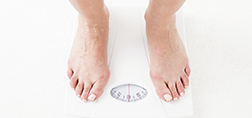
The holidays bring joy to many of us, but they aren’t always so kind to our overall health.
We may feel stressed from trying to do too much, working to please everyone, getting less sleep, exercising less and constantly trying to avoid all the unhealthy food that comes with the holidays.
To make matters worse, all that stress combined with less sleep makes our bodies crave sugar and then store it as belly fat. Yikes! Add alcohol to the mixture, and hot flashes and night sweats can occur, making the holiday roller coaster even worse.
You may think you are destined to gain extra weight during this time of year, but it doesn’t have to be that way.
You can either read this blog and feel depressed when you are done, or you can take the information and use it as a guide for how to enjoy the holidays the healthy way. All it takes is a little planning and some self control.
Let’s use a patient I’ll call Lisa as an example of how to enjoy the holidays and end up with better health.
Lisa is 51 and just starting menopause. She is taking a low dose of hormones, and she still experiences an occasional hot flash if she forgets to change her patch, gains a few extra pounds, drinks too much wine, is sleep deprived, or forgets to drink enough water.
When Lisa came to see me for her annual check up, she was very worried about the holidays—specifically weight gain.
Like many people, Lisa had several stressors she knew she would be tackling. She was trying to coordinate extended family events to be sure certain family members wouldn’t be together at the same time.
Lisa was also preparing herself mentally for the arrival of her college-age kids. She was excited to see them, of course, but she knew it would be an adjustment for everyone after settling in to their new routines. In addition, Lisa worked full time and was barely able to stick to her exercise routine because of frequent late meetings.
Adding the stress of the holidays could challenge her exercise and eating habits even more. She had just settled into a solid sleep routine and didn’t want holiday to-do lists and night sweats to upset that routine. It was time to make a plan.
Lisa had already outlined her goals, and when she came to see me, she shared them with me. She wanted to:
- Not have hot flashes.
- Continue her solid sleeping pattern.
- Not gain weight.
- Be happy and enjoy her family in the midst of potential conflicts and overload.
Lisa had already learned her symptom triggers (inadequate sleep, wine, sugar, stress and excitement), and she knew her barriers (full-time work schedule, extra events on her calendar, and holiday baking and shopping for everyone). Her next step was figuring out how to accomplish everything while avoiding triggers.
I was confident Lisa could attain her goals with planning, preparation and a few simple rules.
Lisa was aware that if she took care of herself she would be happier, healthier, able to accomplish more, and just more fun to be around. So she committed to planning out each week during the month of December.
Every Sunday afternoon she would make a prioritized list of things she needed to accomplish and break it down by daily tasks. Lisa included meal plans, exercise, work events, family time, changing her patch, taking her vitamins and sleep on her daily list. This would ensure she wouldn’t forget anything or have any excuses for not getting these things done.
Next, Lisa outlined a few rules for herself. She knew certain foods triggered issues like night sweats, weight gain and frustration, so she committed to the following rules:
- No carbs after 3 p.m. (unless one glass of wine was the sugar treat for the day).
- Limit simple carbs to one serving per day.
- Drink eight glasses of water per day.
- Watch what she ate at holiday parties (choose lean meats, veggies and salad over carbs when available).
- Exercise vigorously, even if it meant shorter workouts, to accommodate other obligations.
- Make sleep a priority and stick to her pre-bedtime ritual: Five minutes of gratitude and metered breathing and no screen time. She also vowed to get up immediately in the middle of the night if she awoke (instead of tossing and turning, worrying about things she needed to get done).
As you can see, Lisa made a plan designed to help her make it through the holidays in good health. She set goals and made some rules to help her plan become a reality.
You can achieve success as well by setting your own goals, knowing your symptom triggers, listing your barriers and outlining the rules that will help you realize those goals.
 /a>
/a>
 /a>
/a>
 /a>
/a>